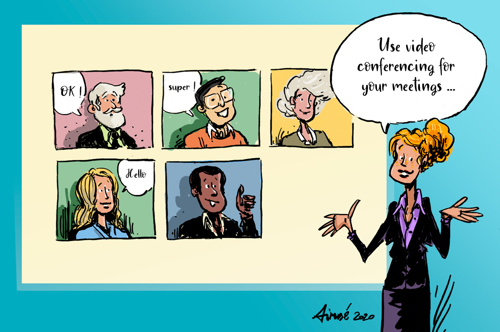- Corporate Law and M&A
- Leo Peeters
- corona , Corona virus , corporate bodies , management body , bondholder , shareholder , VZW , ASBL
The far-reaching measures taken to limit the spread of the coronavirus require that social distancing be respected, in particular a distance of at least 1,5 meter between each person should be respected. Undoubtedly this will impact the corporate life of companies and associations, and their bodies.
The government however is introducing a relaxation of the conditions for the organisation of general meetings of shareholders.
Many companies and associations have their financial year-end on 31 December 2020. This means that annual accounts and annual reports have to be made by the management body of the company and that annual shareholders’ meeting or member meetings have to take place.
Of course, management bodies as well as general shareholders’ meeting and member meeting will meet any time needed.
It is expected that directors, shareholders, members and the statutory auditor attend the meetings. However, this will be impossible now with the corona measures and the required social distancing.
The law offers solutions to organize meetings or to take decisions without physical presence.
But force majeure is always applicable, as well as the principle “necessity knows no law”.
Hereafter we give an overview of what is permitted in respect of the decision making process of each corporate body, according to the respective corporate form.

1. Decisions of the management body
The management body of the private limited liability company (BV/SRL) that is composed of several members acting as one body, the management body of the non-profit organisation, the board of directors of the public limited liability company (NV/SA), the supervisory board and the executive committee of the public limited liability company (NV/SA) have each the right to take decisions in writing, subject to the condition that the decisions are unanimously approved by all the members.
It is possible that the articles of association have excluded the possibility to take decisions in writing. With respect to the supervisory board and the executive committee the articles of association may have stipulated that certain decisions cannot be taken in writing, in which case physical meetings should take place.
It should be noted that most of the current, up to date articles of association allow the management body to decide in writing, or at least do not exclude this possibility. They even create the possibility to meet remote, of with power of attorneys (in which case the representation may be limited).
2. Decisions of shareholders and members
Also, the shareholders of companies have the possibility to resolve unanimously and in writing on any topic that belongs to the competence of the shareholders’ meeting, except for those decisions that ought to be taken in front of a notary public.
Such decisions have to be shared with the management body, the statutory auditor and certain category of holders of securities.
Should the company decide to convene a general shareholders’ meeting, several options are available:
- The shareholder can appoint a proxy who attends the meeting on his behalf. Sometimes the articles of association limit the number of representations, but for most companies this is not the case;
- The shareholder may cast his vote in writing prior to the general shareholders’ meeting; a limited liability company (NV/SA) can provide for the possibility to vote via the website;
- The shareholder may cast his vote electronically prior to the general meeting;
- The shareholder can attend the meeting remote, via the communication tool the company offers.
The articles of association must provide for these alternatives to hold the general shareholders’ meetings, which for most of the companies is the case.
When shareholders cast their vote remotely, or when shareholders can attend the meetings remotely, the company must make sure that their capacity and identity can be controlled. All the remote attendees must be able to participate in the meeting without interruption and all at the same time.
The chairman, the secretary (and possibly the scrutineer) are not allowed to remotely participate in the meeting, as well as the management body and the statutory auditor.
3. Decisions of the bondholders
Also, the decisions of the bondholder can be taken electronically or in writing. A decision will be deemed adopted if the bondholders who represent at least 75% of the amount of the existing bonds, approve such decision.
The rules with respect to the convocation of the bondholders’ meeting must be taken into consideration, even when the decision making is in writing or remotely.
4. Decisions of the members of the not for profit organizations (VZW/ASBL)
Unlike for the companies, the law does not provide for the possibility for the members to have decisions taken in written form. The law allows that members are represented at the meeting. Unless the articles of the association provide otherwise such representation is unlimited.
Please note that the law does not exclude or forbid the members to take decisions in writing (in the same as companies) or to have meeting with a remote attendance. In such case, either all the members must unconditionally agree with such procedure or the articles of association must explicitly allow this.
5. Government Measures
The measures taken by the Government derogate from existing rules regarding the organisation of meetings of the corporate bodies and the filing of annual accounts for the period from 1 March until 30 June 2020.
Companies (the Royal Decree concerns all legal or corporate entities, whether or not regulated) are not obliged to apply these specific derogations. Decisions already taken by meetings validly held remain valid.
5.1 The general meeting
5.1.1 The conduct of the general meeting
The management body can impose the participants of a general meeting, prior to such meeting:
- to cast their vote by means of a form that the company has provided, in accordance with the law or the articles of association; or
- to grant a power of attorney to a person designated by the management body. This power of attorney must contain specific voting instruction in order to be validly used.
The completed and signed voting form or power of attorney may be sent to the company by all means, including e-mail with a scan of photograph of the document.
If the company has imposed the participants to a general meeting to cast their vote through the voting form or the power of attorney, it may forbid participants to physically attend the meeting, and it may require that questions are raised in writing prior to such meeting.
The management body must reply to such questions prior to any vote either in writing or orally, if the meeting takes place via electronic communication.
A general meeting can be held via electronic communication, even if the articles of association have not provided for this.
The Code regarding companies and associations required the physical presence of the bureau, the management body and the statutory auditor at a general meeting. The Royal Decree now allows these participants to attend the meeting "at distance".
Decisions that must be notarized, require the physical presence of the notary and at least one representative of the company.
5.1.2 Postponement and extension of deadlines
General meetings already planned in the period from 1 March to 30 June, can be postponed without too much formalities. Companies must take care that shareholders are properly informed of such postponement, e.g. via website, e-mail or mail, without complying with the formalities for convening a meeting.
Finally, the government has decided to give the management body the opportunity to postpone the general meeting to approve the annual account to a later date, even if such meeting was already convened.
If the management body takes such a decision, the following deadlines are postponed with ten weeks :
- The period of six months after the end of the financial year to submit the annual accounts to the general shareholders’ meeting;
- The period of seven months after the end of the financial year to file the annual account with the National Bank. The terms of nine, ten, twelve or thirteen months from the end of a financial that determines the sanction for late filing of the annual accounts are extended with ten weeks as well.
The extension also applies for the not for profit organisation with respect to the submission of its annual budget, as well as for the filing of the financial information by branch offices of foreign legal entities.
It should be noted that the general meeting cannot be postponed according to this royal decree if it was convened in accordance with the specific procedure in case of negative equity of the company, if it was convened at the request of shareholders or the statutory auditor, or if it was convened by the statutory auditor.
5.2 The Management body
The management body can take all decisions either in writing or electronically (e-mail), if the decisions are taken by unanimity.
All meeting of the management body can be held remotely, via electronic communication, such as telephone or video conferencing, if all the members can participate at the same time.
The presence of one representative at a meeting with the notary public is sufficient if such representative is duly and validly empowered.
5.3 The general meeting of the Association of co-owners
The general meeting of the co-owners that could not be held from 10 March 2002 to 30 June 2020, must be held within five months after the crisis.
During the period that such meeting is postponed the appointments remain valid. The contract between the co-owners‘ association and the property management is automatically extended. The property management will continue to manage within the limits of the most recently approved budget.
Please, do not hesitate to contact us. It goes without saying, that we can assist you, first of all to assess your legal position and to consider what action you can or should take in this crisis. You can always contact us on +32 (0) 02 747 40 07 or CoronaTaskforce@seeds.law.







